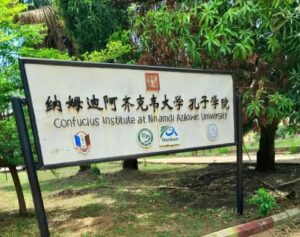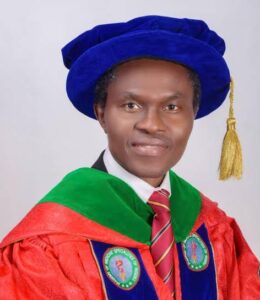Revaluing Academic Labour in Nigeria: Why Professors Deserve Parity with Top Government Officials

Nigeria’s academic community is the foundation of the country’s educational system, driving innovation and shaping the minds of future generations. However, despite their critical role, professors in Nigeria are frequently undervalued and overworked, with salaries and benefits significantly lower than those of top government officials.
The disparity in compensation and benefits between professors and top government officials is not only unjust, but it has serious implications for Nigeria’s academic profession. It causes brain drain, reduced diversity, and lower morale, all of which have an impact on the country’s educational and research quality and consequently the development of the nation.
This article contends that Nigerian professors deserve salaries and benefits comparable to those of top government officials. By examining the value of academic labour, the disparity in compensation and benefits, and the advantages of parity, we can make a compelling case for why Nigerian professors should be recognized and rewarded for their important work.
As Nigeria continues to face developmental challenges, it is critical that we prioritize education and recognize the critical role that professors play in driving innovation and growth. By revaluing academic labour and promoting parity, we can create a more equitable and long-term academic environment that benefits not only professors but also students, communities, and the nation as whole.
The Value of Academic Labour
Academic labour is the foundation of Nigeria’s educational system, propelling innovation and shaping the minds of future generations. Professors in Nigeria play an important role in:
- Knowledge Creation and Dissemination: Professors conduct research, publish scholarly articles, and teach students, all of which help to advance knowledge in a variety of fields.
- Human Capital Development: Professors mentor and guide students as they learn critical thinking, problem-solving, and communication skills.
- Community Engagement and Service: Professors participate in community outreach, partnerships, and service, utilizing their expertise to solve real-world problems.
- National Development: Professors contribute to Nigeria’s development through research, policy advice, and community engagement, thereby promoting economic growth, social mobility, and civic participation. Skills and qualifications
To become a professor in Nigeria, one needs: - Advanced Degrees: At least a master’s degree, and frequently a Ph.D., in a relevant field.
- Research and Publication: A successful track record of research and publication in reputable academic journals.
- Teaching and Mentoring: Demonstrates exceptional teaching and mentoring abilities, as well as the ability to motivate and guide students.
- Community Engagement: A strong commitment to community service and the ability to apply academic knowledge to real-world problems. Examples of Notable Nigerian Professors
Several Nigerian professors have made significant contributions to the country’s educational and research systems. Examples include: - Professor Grace Alele-Williams: A well-known mathematician and educator who was the first Nigerian woman to complete a Ph.D. in mathematics.
- Professor Ayodeji Falaiye: A renowned historian and educator who has contributed significantly to the study of Nigerian history and culture.
- Professor Oyewusi Ibidapo-Obe: An accomplished engineer and educator who has made significant contributions to the advancement of engineering education in Nigeria.
Recognizing the value of academic labour allows us to begin to make the case for why Nigerian professors should be treated equally with top government officials.
The Disparity in Compensation and Benefits
Despite their critical role in Nigeria’s education system, professors are frequently compensated at a significantly lower level than top government officials.
Salary comparison
Professors:
- Entry-level (Lecturer II): ₦2.5 million to ₦4 million per year.
- Senior lecturers earn between ₦5 million and ₦8 million annually.
- Professors earn between ₦8 million and ₦12 million annually.
Top Government Officials: - Federal Ministers earn between ₦2.4 million and ₦3.5 million per month (₦28.8 million to ₦42 million annually).
- Senators earn between ₦1.5 million and ₦2.5 million per month (₦18 million to ₦30 million annually).
- Governors earn between ₦2.2 million and ₦3.2 million per month (₦26.4 million to ₦38.4 million annually).
- Professors :
- Limited health insurance.
- Retirement plans (such as the Contributory Pension Scheme)
- Limited housing benefits.
Top Government Officials : - Comprehensive health insurance.
- Generous retirement plans (such as severance packages)
- Luxurious housing benefits (such as official residences)
- Access to official vehicles and drivers.
- Security details
- Professors :
- Limited research grants.
- Minimal travel allowances
- Top Government Officials :
- Large allowances for travel, entertainment, and miscellaneous expenses.
- Access to first-class travel and lodging.
- Luxury vehicles and drivers
- Security details
This disparity in compensation and benefits is not only unjust, but it also has serious implications for Nigeria’s academic profession, such as brain drain, limited diversity, and low morale.
Why Parity is Necessary
Achieving parity between professors and top government officials is critical for several reasons.
Recognizing value
Professors play an important role in Nigeria’s educational system, driving innovation and shaping the minds of future generations. Parity recognizes the value they contribute to society.
Promoting Quality Education
Parity would attract and retain top academic talent, accelerating innovation and promoting quality education.
Addressing Brain Drain
Parity would reduce the likelihood of professors seeking better opportunities abroad, thereby addressing brain drain.
Improving Morale
Paritywould boost professors’ morale, motivation, and job satisfaction, resulting in better teaching, research, and community engagement.
Enhancing National Development
Parity among professors would lead to more effective contributions to Nigeria’s growth and development.
International Best Practices
Parity is consistent with international best practices, in which academics are valued and compensated for their contributions.
By achieving parity, Nigeria can demonstrate its commitment to valuing academic labor, promoting quality education, and propelling national growth.
Implementing Parity: Issues and Solutions
Achieving parity between professors and top government officials in Nigeria will necessitate a thorough examination of the challenges and potential solutions.
Challenges
- Budgetary Constraints: Raising professors’ salaries and benefits to match those of top government officials may necessitate large budgetary investments.
- Resistance from Government and University Administrators: Government and university administrators may be opposed to implementing parity because other budgetary allocations are more important.
- Defining and Measuring Academic Productivity: Creating equitable and transparent metrics to assess academic productivity and performance can be difficult.
- Addressing Existing Inequalities: Enacting parity may necessitate addressing existing inequalities within the academic profession, such as differences between disciplines and institutions. Solutions
- Phased Implementation: Beginning with incremental salary and benefit increases, implementing parity in stages can help manage budgetary constraints.
- Alternative Compensation Models: Investigating alternative compensation models, such as performance-based pay or revenue-sharing schemes, can help alleviate concerns about budget allocations.
- Transparent and Fair Metrics: Creating transparent and fair metrics to assess academic productivity and performance can help ensure that professors are compensated for their contributions.
- Institutional and Government Commitment: Obtaining commitments from institutions and the government to prioritize academic labor and invest in education can aid implementation.
- Stakeholder Engagement: Meeting with stakeholders, such as professors, administrators, and policymakers, can help build consensus and support for implementing parity. Recommendations
- Create a Task Force: Form a task force with representatives from government, institutions, and the academic profession to investigate implementation options and develop a roadmap for parity.
- Conduct a National Study: Conduct a nationwide survey to assess the current state of academic labor in Nigeria and identify areas for improvement.
- Develop a Compensation Framework: Create a compensation plan that considers academic productivity, performance, and market rates.
- Secure Government Commitment: Obtain a commitment from the government to prioritize education and invest in academic labor.
Finally, Nigerian academic labor has been undervalued for far too long. Professors play an important role in shaping the minds of future generations, driving innovation, and promoting national development. However, they are frequently undervalued and overworked, with salaries and benefits far lower than those of top government officials.
Achieving parity between professors and top government officials is critical for promoting quality education, driving innovation, and acknowledging the value of academic labor. While there are some challenges to achieving parity, the benefits far outweigh the costs.
We urge the Nigerian government, institutions, and stakeholders to prioritize academic labor and invest in education. By revaluing academic labor and achieving parity, we can create a more equitable and sustainable academic environment that benefits not only professors, but also students, communities, and the country as a whole.
Recommendations for Action
- Form a task force to investigate implementation options and create a road map for parity.
- Conduct a nationwide survey to assess the current state of academic labor in Nigeria and identify areas for improvement.
- Create a compensation framework that considers academic productivity, performance, and market rates.
- Secure the government’s commitment to prioritizing education and investing in academic labor.
Working together, we can revalue academic labor in Nigeria and ensure that professors are recognized and compensated appropriately.
©️ Innocent Nnubia, PhD,
ASUU-NAU/[email protected]









